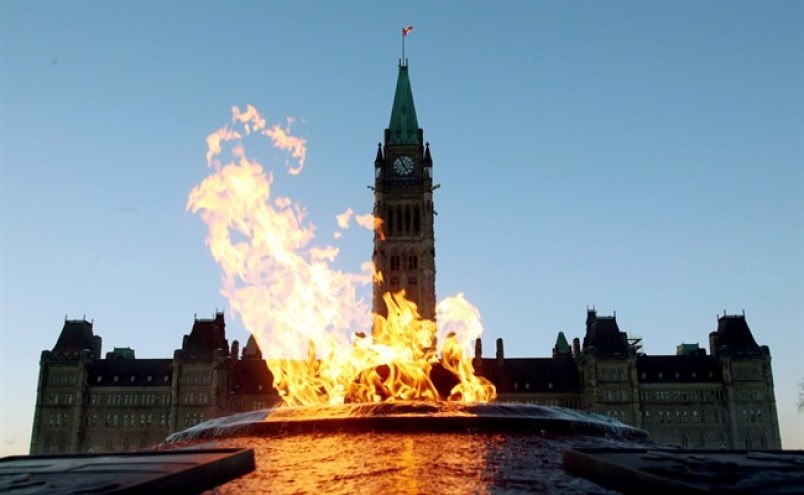A commentary by a former editorial writer and columnist for the Times Colonist. Until recently, he taught business and professional writing at the University of Victoria.
The COVID-19 pandemic will eventually be over and Canadian society will return to “normal.” Or will it?
If we go back to politics as usual, then as a nation we will have learned nothing from this pandemic disaster. What should we have learned? What needs to be different for Canada in the post-COVID-19 world?
For a start, in 2020 alone the Canadian government will run a budget deficit of at least $250 billion trying to cushion the economic impact of the COVID-19 economic shutdown. This extra spending comes on top of five previous years of deficits of about $20 billion a year, or $100 billion, under the Justin Trudeau Liberals.
If five years of Trudeau government hadn’t run up about $100 billion in deficits — if the federal government had instead run surpluses, which was quite possible since the economy has been strong for more than a decade — Canada would be $100-billion further ahead today, when we have a true spending emergency.
In a post-COVID-19 Canada, Canadian governments must recognize that deficit spending in good economic times is irresponsible and no longer acceptable. Governments should, instead, work at building surpluses to mitigate the shock of any future pandemics, which seem inevitable in a globalized world.
Second, the Liberal government needs to seriously rethink its policy of hobbling Western resource production in the name of environmental and climate goals. To recover from the COVID-19 financial damage, we will need every economic engine running at full capacity. This especially applies to Alberta’s fossil-fuel industry, which has been a major driver of the Canadian economy for decades, but also the environmental movement’s chief whipping boy.
Third, we need to seriously rethink our diplomatic and trading relationship with China.
In mid-April, 100 influence-makers sent an open letter to the Chinese government, and people noting that COVID-19 was China’s “Chernobyl moment.” As anyone who has seen the HBO docudrama Chernobyl knows, the Chernobyl nuclear plant meltdown of 1986 could have irradiated half of Eastern Europe, affecting tens of millions of people.
The Chernobyl near-disaster was created by the Soviet government’s desperate need to protect, under a cloak of secrecy, its self-image as the perfect communist society. Many, including the 100 letter-writers, believe Chernobyl was the crisis that ushered in the end of Soviet communism. Chernobyl showed that a closed society was not compatible with a modern technological society, which demands openness.
Similarly, the COVID-19 pandemic is primarily a product of Chinese government’s need for secrecy to protect the Communist Party’s image. If the world had been warned sooner, as a more open society than China’s would have done, perhaps much of the COVID-19 damage could have been prevented or contained.
In the process, China has revealed itself as a closed totalitarian society and not our friend. We can’t shun China, but to protect ourselves, we should also be moving as much of our industrial, technological and pharmaceutical production as possible away from China toward more open, democratically inclined nations.
Finally, the COVID-19 crisis has shown Canada needs a more flexible medical system. So far, Canada’s public hospitals have not been overwhelmed by COVID-19 cases, in part because Canada’s response to the pandemic has been effective. But at the same time, thousands of surgeries have been postponed and thousands of patients moved from hospital beds to make way for possible COVID-19 patients. Some patients moved in favour of COVID-19 cases have died of ailments such as heart disease and cancer that might otherwise have been treated.
To meet future medical emergencies such as COVID-19 — and in a globalized world it’s hard to believe there won’t be a similar pandemic in the foreseeable future — we need to move toward a public-private health system, like almost all of the rest of the developed world. A public-private health system would mean more doctors and more hospital and clinical facilities overall, giving Canada the extra capacity it might need to cope with future pandemics while still preserving medical care for all.
Finally, we need to rethink our response to the next pandemic, which is inevitable in a globalized world. Are we going to again shut down the Canadian and world economy when COVID-21 strikes? Or COVID-22? To close down our economy each time a pandemic appears is, or should be, unthinkable.
As many have suggested, what’s needed in future is a more focused response. In the COVID-19 pandemic, seniors and those with multiple health problems have been by far the main victims. In earlier flu epidemics, younger people have been targeted. If we don’t want to shut the world down every few years, we need to focus on isolating the most vulnerable target groups while other Canadians go about their lives.
The open letter urged the Chinese government and people to rethink their closed system. In the same way, Canadians need to re-imagine our more open system as well if we don’t want to be blindsided, again, by future pandemics.



